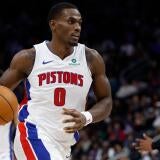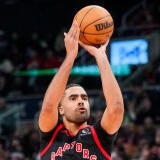Kenneth Faried's big summer could lead to massive payday
Nuggets big man set to be restricted free agent next summer if team doesn't opt for an extension. Either way, the Manimal is set to get paid.

Denver Nuggets forward Kenneth Faried is a bit of a conundrum. He has been since he came into the league. He projected as an effort bench player out of Morehead State in 2011. Then-Nuggets coach George Karl didn't even plan to play him, not being a fan of rookies like most veteran coaches. But when Nene was injured, Faried made it impossible to not play him.
He earned the starting job, the Nuggets traded Nene. And Faried became a fan favorite. But his game provided a debate between two stark contrasts. He's an impact player with his effort and overall production. He produces rebounds, blocks and points, but beyond that, his effort-plays can transform the momentum of a game. At the same time, he's been a poor help defender and lacked a consistent set of offensive moves.
The results for Faried in terms of him being an overall plus have been mixed. He was plus-5.3 when on the court in the Nuggets' 57-win 2013 season, but the Nuggets were also really good then. His net on-off per 100 possessions figure was just plus-0.2. Conversely, when things fell apart in monumental ways last season for Denver, Faried finished minus-3.1 when on the floor, and minus-2.1 compared to his time off the court. Pretty standard for your average starter, but also proof that he was as much a part of the problem as he was a part of the solution.
Faried and coach Brian Shaw clashed for much of the start of Shaw's first season with Denver. Faried floated in and out of the starting lineup, and was often the target of post-game criticism from Shaw. Shaw's the type of coach that no matter how many effort buckets you create, no matter how many big plays you make, if you aren't listening and adopting his points of emphasis, you're going to stay in his doghouse.
It looked like the Nuggets would seek to move Faried by last year's deadline ... just as it appeared Masai Ujiri's Nuggets would consider the same to avoid the awkward question of how much to pay him in an extension or in restricted free agency. Faried was too valuable to let go, not concretely good enough in impactful ways to warrant what he would inevitably garner in extension or free agency talks. The Nuggets' new regime faced the same problem through the first several months of the season last year, on top of veteran unrest (Andre Miller was suspended and eventually traded following a tirade against Shaw), massive injuries (eventually the Nuggets would lose Danilo Gallinari, JaVale McGee, Nate Robinson, and J.J. Hickson to season-ending injuries).
And then, in the second half of the year, Faried began to turn things around in a big way. Faried averaged 15.2 points and 11.0 rebounds per 36 minutes before the All-Star break. After the All-Star break, his scoring skyrocketed to 21.7 points per 36 minutes, and 11.7 rebounds. What's interesting is that Faried wasn't noticeably more efficient. He shot 54.4 percent from the field before the All-Star break, and 54.6 percent after. He just became a much bigger part of the offense, and Shaw trusted him more.
That's when you saw things like this, in which Faried dropped 34 points, some of them on the next big thing Anthony Davis (who was limited with back spasms).


Faried may never get to be like say, Al Jefferson, in terms of footwork, but he's learning how to use his specific counter-moves to create scoring opportunities. He's added a running hybrid-hook and a spin move. These moves are going to get scouted and become more difficult to routinely go to, but their simplicity is built on his physical gifts.
Then, Faried hit Team USA this summer. Few expected him to make the team; he didn't carry the star power of DeMarcus Cousins, the hype of Andre Drummond, and didn't go to Duke like Mason Plumlee. But then he wound up starting on Team USA. Even Faried was surprised.
Q: Back in Vegas when this team got together, what were your expectations?
A: My expectation was probably to make the team, maybe make it as one of the 12th men, and hopefully win the gold, cheer my teammates on. I was excited about that. But everything seemed to fall into place. I exceeded those expectations. And I'm ecstatic about it.
via Q&A with Kenneth Faried - Marc Stein Blog - ESPN.
When I first wrote about the Team USA roster, I didn't think twice about the idea Faried could make it. He wasn't a great defender, or a rim protector with size, or a gifted post-up big man, or a stretch four. Why would he make the team? But watching him with Team USA, it's patently obvious how useful he is. His pure athleticism makes a massive impact vs. the smaller teams, and having his nitro-boost energy constantly wearing on teams changes the dynamic of where their defensive focus is. He's a natural fit, something I should have been aware of from the start.
But there's a corollary to the heartwarming story of this scrappy player out of Morehead State finding his way into a starting spot for the "best" (available) of America. It also means Faried is going to get paid in a big way. And that could mean a real comparison to Al Jefferson. From the Sporting News:
Before the last few months, one general manager said, Faried might have been, “in the Paul Millsap or Taj Gibson range.” Millsap is slated to make $9.5 million next year, while Gibson will get $8 million. But given what’s happened since March, Faried could be pushing into an, “Al Jefferson kind of deal, maybe more.”
Jefferson is slated to make $13.7 million next year. He averaged 21.8 points and 10.8 rebounds last year, shooting 50.9 percent from the field. “If they continue to play the way they did in the second half (of last season) and get the ball to Faried more offensively, he is going to put up numbers close to Jefferson’s but he is a much, much better defensive player, too,” the East GM said.
Is Faried worth a contract that pays, say, $58 million over four years? Remember that players like Chandler Parsons and Gordon Hayward each got deals starting at $14.7 million. And that Derrick Favors’ extension kicks in this year with Utah, and he is on a four-year, $47 million deal. In that context, a deal starting at about $13 million is fair, or perhaps even low.
via What is Kenneth Faried's working-class game worth? | NBA | Sporting News.
Is Faried worth more than fellow teammate Ty Lawson? Or Jefferson? He appears to be worth more than Favors, who has slid without help around him. A lot of it comes down to this, as it does with many players: It depends on the team and what they need. Faried can put a team over the hump. For instance, if Terrence Jones or Donatas Motiejunas don't work out for the Rockets, he would be in an invaluable fit next to Dwight Howard.
If, on the other hand, you're a grind-it-out team that needs a player with a diverse post-move-set, then he loses value. Then again, the Nuggets are somewhere in-between. They are both a slow-it-down team, and have a perimeter-oriented roster. Their offseason hasn't crystalized what they need to do with Faried, it's only made it more complicated. But one thing is clear. Faried will be getting significantly more than it looked as if he would last January. How much and where is the question, and could be one of the more interesting subplots of the next year on the second-tier level of NBA stars.
Meanwhile, the Summer of Faried continues.

















